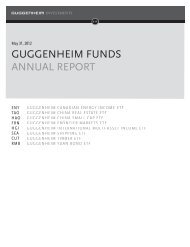Guggenheim Credit Allocation Fund GGM - Guggenheim Investments
Guggenheim Credit Allocation Fund GGM - Guggenheim Investments
Guggenheim Credit Allocation Fund GGM - Guggenheim Investments
- No tags were found...
You also want an ePaper? Increase the reach of your titles
YUMPU automatically turns print PDFs into web optimized ePapers that Google loves.
At any time after the date of this prospectus, legislation may be enacted that could negatively affect the assets ofthe <strong>Fund</strong> or the issuers of such assets. Changing approaches to regulation may have a negative impact on the<strong>Fund</strong> or entities in which the <strong>Fund</strong> invests. Legislation or regulation may also change the way in which the<strong>Fund</strong> itself is regulated. There can be no assurance that future legislation, regulation or deregulation will nothave a material adverse effect on the <strong>Fund</strong> or will not impair the ability of the <strong>Fund</strong> to achieve its investmentobjective. See “Risks—Legislation and Regulation Risk.”Portfolio turnover riskThe <strong>Fund</strong>’s annual portfolio turnover rate may vary greatly from year to year. Portfolio turnover rate is notconsidered a limiting factor in the execution of investment decisions for the <strong>Fund</strong>. A higher portfolio turnoverrate results in correspondingly greater brokerage commissions and other transactional expenses that are borneby the <strong>Fund</strong>. High portfolio turnover may result in an increased realization of net short-term capital gains by the<strong>Fund</strong> which, when distributed to Common Shareholders, will be taxable as ordinary income. Additionally, in adeclining market, portfolio turnover may result in realized capital losses. See “Tax Matters.”When-issued and delayed delivery transactions riskSecurities purchased on a when-issued or delayed delivery basis may expose the <strong>Fund</strong> to counterparty risk ofdefault as well as the risk that securities may experience fluctuations in value prior to their actual delivery. The<strong>Fund</strong> generally will not accrue income with respect to a when-issued or delayed delivery security prior to itsstated delivery date. Purchasing securities on a when-issued or delayed delivery basis can involve the additionalrisk that the price or yield available in the market when the delivery takes place may not be as favorable as thatobtained in the transaction itself. See “Risks—When-Issued and Delayed Delivery Transactions Risk.”Short sales riskThe <strong>Fund</strong> may make short sales of securities. A short sale is a transaction in which the <strong>Fund</strong> sells a security itdoes not own. If the price of the security sold short increases between the time of the short sale and the time the<strong>Fund</strong> replaces the borrowed security, the <strong>Fund</strong> will incur a loss; conversely, if the price declines, the <strong>Fund</strong> willrealize a capital gain. Any gain will be decreased, and any loss will be increased, by the transaction costsincurred by the <strong>Fund</strong>, including the costs associated with providing collateral to the broker-dealer (usually cashand liquid securities) and the maintenance of collateral with its custodian. Although the <strong>Fund</strong>’s gain is limitedto the price at which it sold the security short, its potential loss is theoretically unlimited. The <strong>Fund</strong> may have topay a premium to borrow the securities and must pay any dividends or interest payable on the securities untilthey are replaced, which will be expenses of the <strong>Fund</strong>.Repurchase agreement riskA repurchase agreement exposes the <strong>Fund</strong> to the risk that the party that sells the security may default on itsobligation to repurchase it. The <strong>Fund</strong> may lose money because it cannot sell the security at the agreed-upontime and price or the security loses value before it can be sold. See “Risks—Repurchase Agreement Risk.”Securities lending riskThe <strong>Fund</strong> may lend its portfolio securities to banks or dealers which meet the creditworthiness standardsestablished by the Board of Trustees. Securities lending is subject to the risk that loaned securities may not beavailable to the <strong>Fund</strong> on a timely basis and the <strong>Fund</strong> may therefore lose the opportunity to sell the securities at adesirable price. Any loss in the market price of securities loaned by the <strong>Fund</strong> that occurs during the term of theloan would be borne by the <strong>Fund</strong> and would adversely affect the <strong>Fund</strong>’s performance. Also, there may be delaysin recovery, or no recovery, of securities loaned or even a loss of rights in the collateral should the borrower ofthe securities fail financially while the loan is outstanding.Risk of failure to qualify as a RICTo qualify for the favorable U.S. federal income tax treatment generally accorded to RICs, the <strong>Fund</strong> must,among other things, derive in each taxable year at least 90% of its gross income from certain prescribedsources, meet certain asset diversification tests and distribute for each taxable year at least 90% of its“investment company taxable income” (generally, ordinary income plus the excess, if any, of net short-term23



